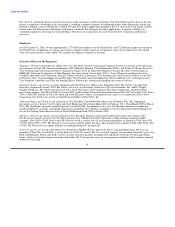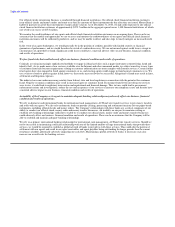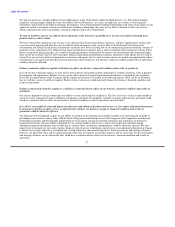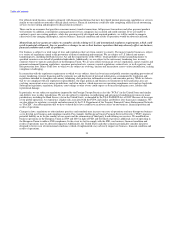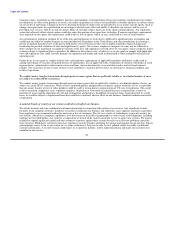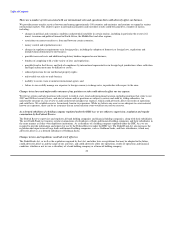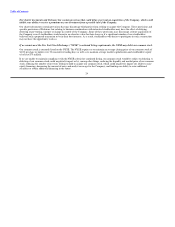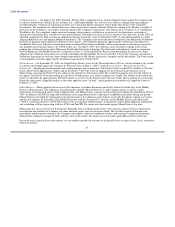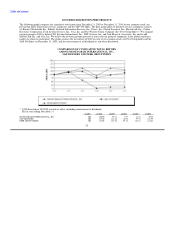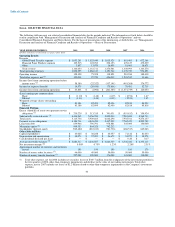MoneyGram 2010 Annual Report Download - page 23
Download and view the complete annual report
Please find page 23 of the 2010 MoneyGram annual report below. You can navigate through the pages in the report by either clicking on the pages listed below, or by using the keyword search tool below to find specific information within the annual report.
Table of Contents
Changes in laws, regulations or other industry practices and standards, or interpretations of legal or regulatory requirements may reduce
the market for or value of our products or services or render our products or services less profitable or obsolete and have an adverse effect
on our results of operations. Changes in the laws affecting the kinds of entities that are permitted to act as money transfer agents (such as
changes in requirements for capitalization or ownership) could adversely affect our ability to distribute our services and the cost of
providing such services, both by us and our agents. Many of our high volume agents are in the check cashing industry. Any regulatory
action that adversely affects check cashers could also cause this portion of our agent base to decline. If onerous regulatory requirements
were imposed on our agents, the requirements could lead to a loss of agents, which, in turn, could lead to a loss of retail business.
Any intentional or negligent violation by us of the laws and regulations set forth above could lead to significant fines or penalties and
could limit our ability to conduct business in some jurisdictions. Regulators in the United States and other jurisdictions are showing a
greater inclination than they have in the past to hold money services businesses like ours to higher standards of agent training and
monitoring for possible violations of laws and regulations by agents. Our systems, employees and processes may not be sufficient to
detect and prevent an intentional or negligent violation of the laws and regulations set forth above by our agents, which could also lead to
us being subject to significant fines or penalties. In addition to those direct costs, a failure by us or our agents to comply with applicable
laws and regulations also could seriously damage our reputation and brands and result in diminished revenue and profit and increased
operating costs.
Failure by us or our agents to comply with the laws and regulatory requirements of applicable regulatory authorities could result in,
among other things, revocation of required licenses or registrations, loss of approved status, termination of contracts with banks or retail
representatives, administrative enforcement actions and fines, class action lawsuits, cease and desist orders and civil and criminal
liability. The occurrence of one or more of these events could have a material adverse effect on our business, financial condition and
results of operations.
We conduct money transfer transactions through agents in some regions that are politically volatile or, in a limited number of cases,
are subject to certain OFAC restrictions.
We conduct money transfer transactions through agents in some regions that are politically volatile or, in a limited number of cases, are
subject to certain OFAC restrictions. While we have instituted policies and procedures to protect against violations of law, it is possible
that our money transfer service or other products could be used by wrong-doers in contravention of U.S. law or regulations. This could
result in increased compliance costs, regulatory inquiries, suspension or revocation of required licenses or registrations, seizure or
forfeiture of assets and the imposition of civil and criminal fees and penalties. In addition to monetary fines or penalties that we could
incur, we could be subject to reputational harm that could have a material adverse effect on our business, financial condition and results
of operations.
A material breach of security of our systems could adversely affect our business.
We obtain, transmit and store confidential customer information in connection with certain of our services. Any significant security
breaches in our computer networks, databases or facilities could harm our business and reputation, cause inquiries and fines or penalties
from regulatory or governmental authorities and cause a loss of customers. We rely on a variety of technologies to provide security for
our systems. Advances in computer capabilities, new discoveries in the field of cryptography or other events or developments, including
improper acts by third parties, may result in a compromise or breach of the security measures we use to protect our systems. We may be
required to expend significant capital and other resources to protect against these security breaches or to alleviate problems caused by
these breaches. Third-party contractors also may experience security breaches involving the storage and transmission of our data. If users
gain improper access to our or our contractor's systems or databases, they may be able to steal, publish, delete or modify confidential
customer information. A security breach could expose us to monetary liability, lead to reputational harm and make our customers less
confident in our services.
20


